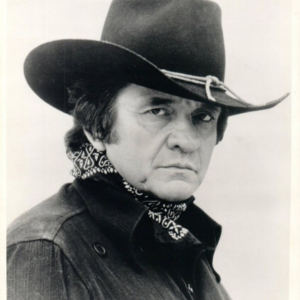
Johnny Cash’s Folsom Prison Blues stands as an undeniable cornerstone in the edifice of country music. Released in 1955, the song, with its stark, evocative imagery and Cash’s raw, resonant vocals, captured the hearts of listeners in a way few songs have ever managed. It is a piece that transcends mere entertainment, delving deep into the human condition and the yearning for freedom.
Background
The song’s title itself is a masterstroke of poetic economy. “Folsom Prison,” a tangible symbol of confinement, is juxtaposed with the “blues,” a musical form traditionally associated with despair and longing. This duality is intrinsic to the song’s emotional core. It is a lament, a cry from the depths of a soul imprisoned not just physically, but spiritually.
Cash’s ability to inhabit the character of a prisoner with such authenticity is a testament to his empathetic artistry. His voice, a gravelly instrument imbued with both world-weariness and a defiant spirit, carries the listener into the cold, hard world of incarceration. The song’s narrative is simple, yet profoundly moving. It paints a vivid picture of a man trapped, looking out at a world in motion while he remains stationary. The imagery of the “fancy dining car” and the “big cigars” is a stark contrast to the prisoner’s bleak reality, underscoring the chasm between the privileged and the condemned.
The song’s enduring appeal lies in its universality. While it is undeniably a product of its time, its themes of isolation, regret, and the human desire for redemption resonate across generations and cultures. It is a song that speaks to the outcast in all of us, to the moments when we feel trapped by circumstances beyond our control.
Folsom Prison Blues also marked a turning point in Cash’s career. It was a song that established him as a serious artist, capable of conveying deep emotions with raw honesty. The subsequent live recording at Folsom Prison in 1968 would elevate the song to mythic status, cementing Cash’s reputation as the Man in Black.
Beyond its musical merits, Folsom Prison Blues is a significant cultural artifact. It offers a glimpse into the penal system of mid-20th century America and raises questions about the nature of justice and punishment. The song’s enduring popularity is a testament to its power to provoke thought and emotion, even decades after its creation.
It is a song that demands to be heard, and to be felt. It is a song that reminds us of our shared humanity, of the capacity for both suffering and resilience. In the annals of country music, Folsom Prison Blues occupies a place of unparalleled significance. It is a song that is as relevant today as it was when it was first released, a timeless masterpiece that continues to inspire and challenge listeners.
Video
Additional Notes
- Songwriting Credits: While often attributed solely to Johnny Cash, the song was actually co-written by Merle Kilgore. Kilgore was a prolific songwriter who penned many hits for other artists.
- Musical Style: Folsom Prison Blues is a classic example of early rockabilly, a genre that blended country music, rhythm and blues, and hillbilly music. Cash’s distinctive vocal style and the song’s driving beat are characteristic of this genre.
- Cultural Impact: The live recording of Folsom Prison Blues at Folsom Prison in 1968 is considered one of the greatest live albums of all time. It helped to redefine country music and brought Cash to a wider audience.
- Cover Versions: Countless artists have covered Folsom Prison Blues, from Elvis Presley to Nine Inch Nails. These versions often offer fresh perspectives on the song while paying homage to the original.